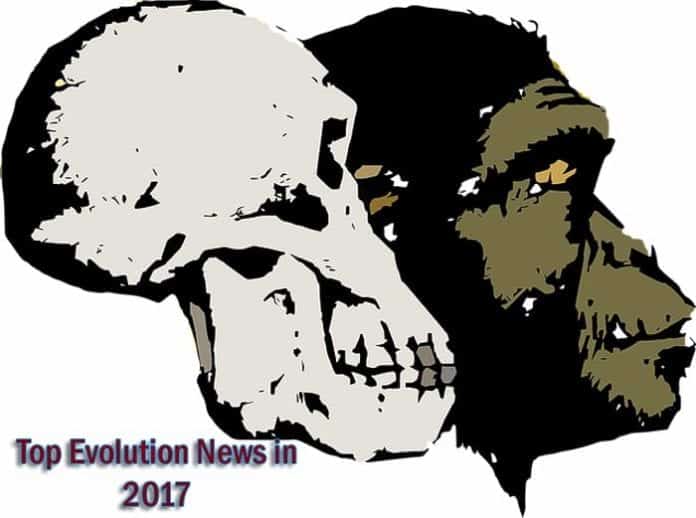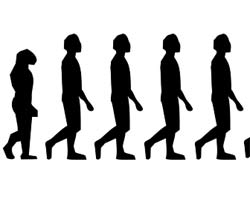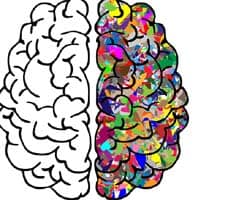
Evolution is a variation in the heritable features of biological groups over succeeding generations (Darwinism). Evolutionary processes contribute advancement in biodiversity at every level of biological organization, including the levels of species, individual organisms, and molecules. In this article, we will go over top 10 evolution news in 2017.
Table of Contents
- Top 10 Evolution News In 2017
- Researchers Identified About 6000 Genes in Mammalian Genome
- Study Reveals Chimpanzee Brian Different From Human Brain
- 3000 Year Old Anicient Human Genomic Analysis
- UK Scientists Published Important Study on Evolution of Body Sizes
- Researchers Challenge the Evolution of Cultural Transmission
- The Cell Journal Publishes Evolutionary History On African Humans
- US Scientists Discover Glycan Molecule in Fossils
- Discovery of Human-like footprints from 5.7 million years old Fossil
- New DNA Sequence Analysis Technique On Human Ancestors
- Neanderthal DNA Study Shows Modern-Day Humans Brain Patterns
Top 10 Evolution News In 2017
Researchers Identified About 6000 Genes in Mammalian Genome

Researchers at IMIM analyzed the mammalian genome and identified approximately 6000 genes that are exclusive only to mammalian species. These genes are not found in groups other than mammals and account for about 2.5% of genes in the human genome. The findings from this study can help understand the acquisition of new genes during evolution and their functional importance.
![]()
Study Reveals Chimpanzee Brian Different From Human Brain

Evolutionary biologists at the University of Edinburgh have studied aspects of the chimpanzee brain and stipulate that it may be much different from humans than previously believed. The human brain has an asymmetrical pattern that enables it to develop certain traits like language learning. Upon closer examination, the study found that this pattern is absent in the chimpanzee brain, where it is divided into two halves.
![]()
3000 Year Old Anicient Human Genomic Analysis

Ancient human remains from Kwazulu-Natal were used by researchers at Uppsala University in Sweden, for a genomic analysis study. They sequenced the genome of 7 individuals from South Africa dating 2300-3000 years ago. The findings from this study indicate that divergence among modern humans occurred about 350,000 and 260,000 years ago.
![]()
UK Scientists Published Important Study on Evolution of Body Sizes

Scientists at the University of Cambridge studied the evolution of body sizes. Results from this study, with data over millions of years, indicate a pulse and stasis pattern in body sizes. Findings point to differences in speed of body growth regarding mass and height occurred throughout evolution.
![]()
Researchers Challenge the Evolution of Cultural Transmission

Researchers at the Washington State University have further studied the process of cultural transmission. They have challenged the old accepted notion that cultural transmission dates back to more than 2 million years.
![]()
The Cell Journal Publishes Evolutionary History On African Humans

A recent study published in “The Cell” Journal has gained insight on human populations that lived in the east and south Africa between 8000-1000 years ago. A team of researchers sequenced 15 African genomes from different regions and had succeeded in restructuring the evolutionary history of the African human population.
![]()
US Scientists Discover Glycan Molecule in Fossils

Scientists at the University of California, San Diego, had discovered a substance called glycan that survives in a 4-million-year-old fossil, even when the DNA of the fossil did not. The findings from the study indicate that in the absence of DNA, researchers can seek out glycan to study the fossils. The presence of this molecule can also provide new methods for the study of human fossils.
![]()
Discovery of Human-like footprints from 5.7 million years old Fossil

Researchers at Uppsala University had discovered new human-like footprints in Crete, which are approximately 5.7 million years old – a time when human ancestors were thought to have ape-like feet.
![]()
New DNA Sequence Analysis Technique On Human Ancestors

Evolutionary biologists at the University of Utah have developed a new technique of DNA sequence analysis that sheds light on the divergence between two important groups of human ancestors during the early archaic era. The Neanderthal-Denisovan lineage separated from modern humans, and later they diverged into two different groups which were around 744,000 years ago. The population of Neanderthals then grew to thousands and scattered throughout Eurasia.
![]()
Neanderthal DNA Study Shows Modern-Day Humans Brain Patterns

Scientists at the National Institute of Mental health studied how Neanderthal-derived DNA affects the modern day human brain. Evidence from MRI scans shows that the genetic variation of Neanderthal DNA inherited by modern-day humans may affect the way the brain works today. Findings from this study suggest that these genetic vestiges may provide some insight into understanding brain-related disorders such as autism and schizophrenia better. In addition to these findings, the more Neanderthal genetic variants or vestiges that are present in a modern human brain, the more it resembles those ancestors.
![]()






















